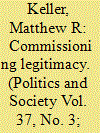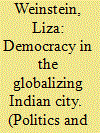|
|
|
Sort Order |
|
|
|
Items / Page
|
|
|
|
|
|
|
| Srl | Item |
| 1 |
ID:
090910


|
|
|
|
|
| Publication |
2009.
|
| Summary/Abstract |
This piece argues that free migration was a central if implicit part of the liberal social contract and that America's founders were both aware of this and exploited it to legitimate their new state. The piece begins by describing this uniquely American contribution to liberal political thought. It then juxtaposes this contribution against the nature of our own international order, to show just how foreign the American Century has become. The piece closes with a short depiction of what an American Century would look like today-were it true to this early ideal-and comments on its feasibility.
|
|
|
|
|
|
|
|
|
|
|
|
|
|
|
|
| 2 |
ID:
090904


|
|
|
|
|
| Publication |
2009.
|
| Summary/Abstract |
Based on an analysis of the reports of twenty-eight national-level public commission inquiries into events involving ethno-national violence-drawn from five national contexts and arrayed over the course of the twentieth century-this article demonstrates the strikingly transnational character of these investigatory bodies' attempts to authoritatively explain episodes of collective violence and to thereby restore governing legitimacy in the wake of violent crises. One of four distinct "logics," or core explanatory frameworks, each associated with a particular mode of "racial power," characterized a diverse cross-national pool of violence commission reports during defined periods of the twentieth century. In revealing globally encompassing logics to what has often been framed as a national or case-specific phenomenon, the author shows how global ideational currents compose a key dimension of national political dynamics.
|
|
|
|
|
|
|
|
|
|
|
|
|
|
|
|
| 3 |
ID:
090906


|
|
|
|
|
| Publication |
2009.
|
| Summary/Abstract |
Transformations under way in Indian cities have begun to alter the opportunities for democratic participation among the urban poor. Highlighting efforts to promote globally oriented urban developments in Mumbai, this article examines the state's engagement with groups directly impacted by these efforts. Based on ethnographic research and interviews with key stakeholders in the Dharavi Redevelopment Project (DRP), the article traces the character of such engagements over the project's four-year planning process. It finds that the state undertook an unusually inclusive process, consulting with resident and activist groups at points throughout this period. The article posits that this novel engagement is an unintended consequence of pressures to promote rapid development and ease investor concerns. Situating this case in the recent literature on political shifts in the globalizing Indian city, it concludes that the state may be engaging more with the urban poor than many of these accounts suggest.
|
|
|
|
|
|
|
|
|
|
|
|
|
|
|
|
| 4 |
ID:
090908


|
|
|
|
|
| Publication |
2009.
|
| Summary/Abstract |
The hypothesis that terrorism often emerges when mass collective action declines and radicals take up arms to compensate for the weakness of a mass movement has been around for some time; however, it has never been tested systematically. In this article the authors investigate the relationship between terrorist violence and mass protest in the context of the Spanish transition to democracy. This period is known for its pacts and negotiations between political elites, but in fact, it was accompanied by high levels of terrorist violence and popular mobilization. To test the hypothesis, the authors have created two data sets, one on victims of terrorism and another on participation in demonstrations. The data clearly confirm that terrorism erupted in Spain when participation in demonstrations started to decline. This result sheds new light on the nonstructural conditions associated with the onset of terrorist violence.
|
|
|
|
|
|
|
|
|
|
|
|
|
|
|
|
| 5 |
ID:
090901


|
|
|
|
|
| Publication |
2009.
|
| Summary/Abstract |
Private, voluntary compliance programs, promoted by global corporations and nongovernmental organizations alike, have produced only modest and uneven improvements in working conditions and labor rights in most global supply chains. Through a detailed study of a major global apparel company and its suppliers, this article argues that this compliance model rests on misguided theoretical and empirical assumptions concerning the power of multinational corporations in global supply chains, the role information (derived from factory audits) plays in shaping the behavior of key actors (e.g., global brands, transnational activist networks, suppliers, purchasing agents, etc.) in these production networks, and the appropriate incentives required to change behavior and promote improvements in labor standards in these emergent centers of global production. The authors argue that it is precisely these faulty assumptions and the way they have come to shape various labor compliance initiatives throughout the world-even more than a lack of commitment, resources, or transparency by global brands and their suppliers to these programs-that explain why this compliance-focused model of private voluntary regulation has not succeeded. In contrast, this article documents that a more commitment-oriented approach to improving labor standards coexists and, in many of the same factories, complements the traditional compliance model. This commitment-oriented approach, based on joint problem solving, information exchange, and the diffusion of best practices, is often obscured by the debates over traditional compliance programs but exists in myriad factories throughout the world and has led to sustained improvements in working conditions and labor rights at these workplaces.
|
|
|
|
|
|
|
|
|
|
|
|
|
|
|
|
|
|
|
|
|